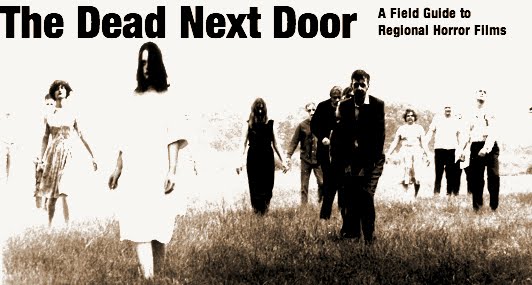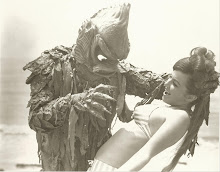
It's true -- low-budget horror film directors are frequently accused of committing crimes against good taste, manners, and cinema in general. A few notable regional filmmakers, however, have committed actual crimes. Here's the quick and dirty Line-Up of the Damned:
Panning for Gold in Baltimore: We've written extensively about former infomercial star Santo Gold (a.k.a. Santo Rigatuso, a.k.a. Bob Harris), the demented mind behind the formerly-lost wrestling film Blood Circus (1985). But we'll repeat ourselves anyway. Rigatuso was eventually convicted of mail fraud in connection with his cheap gold jewelry and credit card authorization business in 1989, and served 10 months in prison. You can read more about it at the Santo Gold Museum. Or get Santo's side of the story here.
Andy Milligan Meets the Army of God: If you've read Jimmy McDonough's fascinating biography The Ghastly One, then you know late director Andy Milligan's life was awash in slightly less-than-legal activities. If you haven't read that book, though, you wouldn't know that one of the actors in the film Carnage (1984) was Dennis Malvasi (a.k.a. Albert Alfano), who later gained some measure of infamy when he and his wife Loretta Marra helped accused murderer James Kopp (who had killed an abortion clinic doctor) escape the country. Malvasi himself was affiliated with the militant anti-abortion group The Army of God, and was arrested in 1987 for bombing several New York City abortion clinics. He was arrested again in 2001 for assisting Kopp, and released in 2003. You can read his whole sordid story in New York Magazine.

Image Courtesy of Fred Adelman/Critical Condition
The Godfather of Gore Goes to Jail, Sort of: Herschell Gordon Lewis was one of the most successful and notorious regional filmmakers who ever spilled a gallon of fake blood, but he ended the first phase of his filmmaking career with 1972's The Gore Gore Girls. Two years later, Lewis was arrested along with business associate Irving Kaufman for their participation in what the Chicago Tribune described as a "bogus abortion referral service franchise." He was eventually convicted of mail fraud charges related to an auto rental franchise business.
According to Lewis, he never actually served any time. Here's his response from the book Shock Value (page 211), after John Waters asks him about the arrests:
"In the abortion thing, I was simply the advertising agency. There never was any particular legal action on that. I don't know quite where that came from but it refers to nothing. Where I lost my fortune, temporarily, was through an auto-mobile-rental deal in which I was the principal investor. The thing went down the tube and everybody got nailed. My theaters and everything I had went with it. At the time I thought it was the worst thing in the world that ever happened, but invariably one springs, phoenixlike, from the ashes."
In Too Deep: Hairdresser-turned-pornographer Gerard Damiano made only one horror film, Legacy of Satan (1974), not long after he made his mark at the helm of Deep Throat (1972), the film that took porno mainstream and got actor Harry Reems (nee Herbert Streicher) arrested in 1975. That film was financed by Louis "Butchie" Peraino, son of Colombo crime family member Anthony Peraino.
The Perainos set up two companies, Bryanston Pictures (a production company) and Bryanston Distributing, in part to mask the massive revenues made by Deep Throat. Bryanston, however, became a success in its own right, and distributed a number of regional horror films, including Damiano's Legacy of Satan, The Texas Chain Saw Massacre, The House That Cried Murder, Andy Milligan's Blood, and Lord Shango.
Ain't it Funny How the Night Screams: The marginal Kansas-lensed slasher film Night Screams (1987) may be best known to horror fans for featuring clips of another marginal slash film, Graduation Day, on a television during its opening sequence. Others may remember it for featuring actor Ron Thomas, who played one of the Cobras in The Karate Kid. But among the Wichita banking community, it is even better known as "that crappy movie executive producer Richard Caliendo financed with money he obtained via shady real estate transactions, defrauding local banks to the tune of $280,000"
In 1992, Caliendo pleaded guilty to making false statements in order to obtain loans for producer Dillis Hart II that were used to finance the film. Hart used the bank loans to buy property from Caliendo, who then paid Hart part of the proceeds to make the movie, and used the rest to pay off an existing debt on the property he'd just sold Hart. Strangely, this complicated real estate transaction is far more interesting than almost anything in Night Screams.
I'm saving the biggest regional horror "true crime" story for a separate post (hint: it involves cocaine and giant, mutant crustaceans). Before we get to that, though, we've got to look at the other side of the criminal justice system -- horror movies made by attorneys.
I'm saving the biggest regional horror "true crime" story for a separate post (hint: it involves cocaine and giant, mutant crustaceans). Before we get to that, though, we've got to look at the other side of the criminal justice system -- horror movies made by attorneys.




No comments:
Post a Comment